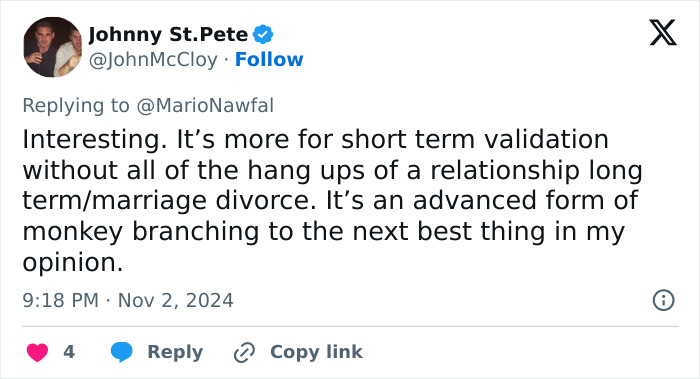“Throning,” has become the latest dating trend. It involves entering relationships to boost one’s reputation. Defined as using a partner for social validation, the behavior focuses specifically on status enhancement. While some may embrace these transactional dynamics knowingly, mismatched expectations can lead to misunderstandings and emotional fallout.
“Throning” refers to the concept of effectively putting a partner on a metaphoric “throne” to display them to others, rather than caring about the partner as a real person.
While throning is a term that has been popularized on social media, especially among Gen Zers, the practice has always existed.
Moreover, throning is a form of hypergamy, which is the practice of dating or marrying someone of higher status in an attempt to better one’s situation in some way, Psychology Today reported in November.
“Throning” has become the latest dating trend
Image credits: Silvestre Leon/Pexels (Not the actual photo)
While hypergamy is motivated by different goals, throning specifically aims to enhance one’s reputation.
“You are dating such-and-such-muckety-muck-big-cheese-hot-tamale so that others will, in turn, assume you are a big enchilada, too,” Bruce Y. Lee, a professor of Health Policy and Management at the City University of New York, wrote for Psychology Today.
“The primary purpose of being with your partner is to bathe in the spout of their clout,” he added.
Image credits: cottonbro studio/Pexels (Not the actual photo)
According to the professor, throning behavior isn’t limited to dating. For instance, some may aim to become more popular by associating themselves with other popular people.
While throning is harmless, when the parties involved are aware and are clear with their attentions, problems may arise if there is a miscommunication.
It involves entering relationships to boost one’s reputation
Image credits: cottonbro studio/Pexels (Not the actual photo)
“This can be the case when the person doing the throning pretends to be interested in the other person as a person rather than just as a reputation,” Professor Lee explained.
He added: “And even if the throner is completely transparent, the anointed one could still misperceive deeper interest—sort of like when car buyers begin to believe that a salesperson is offering a discount only because he or she really likes them.”
Image credits: Los Muertos Crew/Pexels (Not the actual photo)
Defined as using a partner for social validation, the behavior focuses specifically on status enhancement
Image credits: cottonbro studio/Pexels (Not the actual photo)
The professor shared 10 signs that one might be throning you:
Image credits: Kaboompics.com/Pexels (Not the actual photo)
- They tell you they are throning you. Remember what Maya Angelou said, “When someone shows you who they are, believe them the first time.”
- They keep mentioning or asking you about your reputation. Because people tend to talk most about what they care about most.
- They flatter you excessively and brag about you to others. Compliments can be like sugar, sweet in reasonable quantities but icky when there’s way too much.
- They seem self-centered and overly concerned about their reputation. Are they all about me, me, me, or meme, meme, meme on social media?
- They are nicer to you in public than in private. Because they wouldn’t want others to see how they really treat you.
- They seem cold and calculating. When you are alone together—such as when you Netflix and chill—do you feel genuine warmth or a chill running down your spine?
- They don’t seem to be interested in you as a person and don’t share much about themselves. After all, they wouldn’t want any real emotional connection to form, would they?
- They aren’t there for you when you need them. When you are experiencing hard times, do they hardly lift a finger?
- They seem to be very interested in the reputations of others. They may always be on the lookout for a higher rung to swing up to after you’ve served your purpose.
- They have a history of throning. Do they go on and on about how well-known their exes were?
Image credits: cottonbro studio/Pexels (Not the actual photo)
Mismatched expectations can lead to misunderstandings and emotional fallout
Image credits: Andrea Piacquadio/Pexels (Not the actual photo)
Young adults, particularly those in Gen Z, are redefining relationships by prioritizing friendships and emotional compatibility over traditional dating norms, Bored Panda previously reported.
People in their twenties often find love within their friend groups, embracing so-called “situationships” and delaying—or even reconsidering—marriage due to economic pressures and evolving societal expectations.
Amid growing anxiety over “overwhelming” choices that previously weren’t offered, a psychology expert revealed the key to healthy relationships for those younger than 30.
Image credits: cottonbro studio/Pexels (Not the actual photo)
“Throning” refers to the concept of effectively putting a partner on a metaphoric “throne”
Image credits: Yan Krukau/Pexels (Not the actual photo)
“There’s a lot more fluidity in gender identity,” Christina Scott, a professor of Social Psychology at the Department of Psychological Sciences at Whittier College in California, USA, told Bored Panda. “Like it might be, ‘Well, I might be bi[sexual]’ or ‘I might, you know, I might identify queer, and I’m not ready to lock on to one partner.’”
Professor consequently recommended young couples practice communication, openness, and honesty, stating: “[You need to look at] how can you show mutual respect, how can you build trust, how can you be open about what you need and receptive to the needs of your partner with whatever status you have designated between each other.”
The trend sparked different reactions
Image credits: nathaliemayy
Image credits: SouthernUSA1
Image credits: ehelpmann
Image credits: JohnMcCloy
Image credits: victorsin86
Image credits: GOD_JWilly
Image credits: elle_kaye11
Image credits: crown_mystic
Image credits: HensenJanson
Image credits: LykasAristeidis
Image credits: SteveRuonavaara
Ummmmmm.... .. This is not a Gen z thing. This has literally been the entire point of marriage for the past 2000 years of human history. Have we forgotten that marrying "up" or marrying for status has very much been a thing forever, and was literally the point of marriage for many nobles and royals through history? Or that women in history literally had no status as humans and HAD to marry for protection, status, wealth, or name, in order to avoid a life of poverty and being ignored by society?
Right? I can confidently say that pretty much most of my ancestors up until maybe my grands married for $ or status. Not that any of them didn't actually love each other, but I've certainly heard the term "good match" bandied about a time or two
Load More Replies..."When you are alone together such as when you Netflix and chill, do you feel genuine warmth or a chill running down your spine?" You know, I never would have guessed that was a red flag.
I think the writer meant "Do you feel a chill or do you feel warmth?" Of course, I'm only guessing. I'm pretty sure it's a red flag if I feel something running down my spine, like a black widow spider or a viper or a bunch of fire ants.
Load More Replies...Ummmmmm.... .. This is not a Gen z thing. This has literally been the entire point of marriage for the past 2000 years of human history. Have we forgotten that marrying "up" or marrying for status has very much been a thing forever, and was literally the point of marriage for many nobles and royals through history? Or that women in history literally had no status as humans and HAD to marry for protection, status, wealth, or name, in order to avoid a life of poverty and being ignored by society?
Right? I can confidently say that pretty much most of my ancestors up until maybe my grands married for $ or status. Not that any of them didn't actually love each other, but I've certainly heard the term "good match" bandied about a time or two
Load More Replies..."When you are alone together such as when you Netflix and chill, do you feel genuine warmth or a chill running down your spine?" You know, I never would have guessed that was a red flag.
I think the writer meant "Do you feel a chill or do you feel warmth?" Of course, I'm only guessing. I'm pretty sure it's a red flag if I feel something running down my spine, like a black widow spider or a viper or a bunch of fire ants.
Load More Replies...
 Dark Mode
Dark Mode 

 No fees, cancel anytime
No fees, cancel anytime 


















































![“Am I The [Jerk] For Leaving My Bumble Date ‘Stranded’ At A Restaurant?”](https://www.boredpanda.com/blog/wp-content/uploads/2024/12/date-leaves-girl-stranded-restaurant-coverimage.jpg)















-13
22